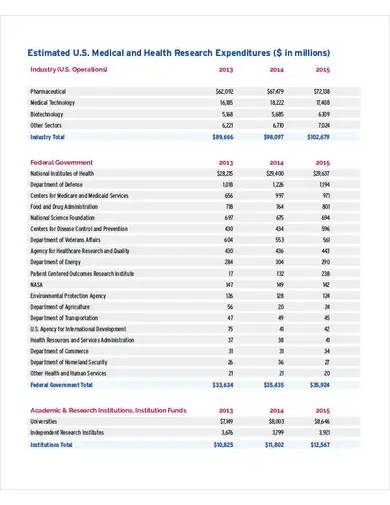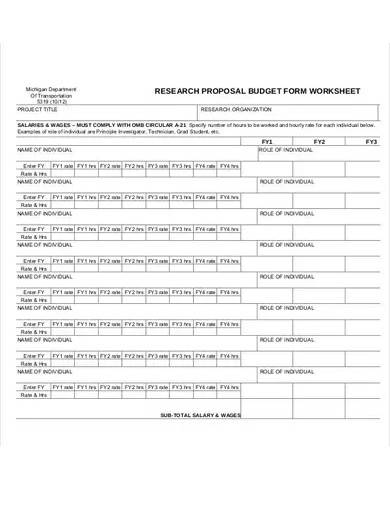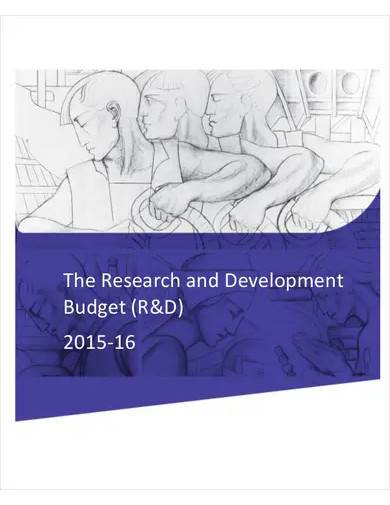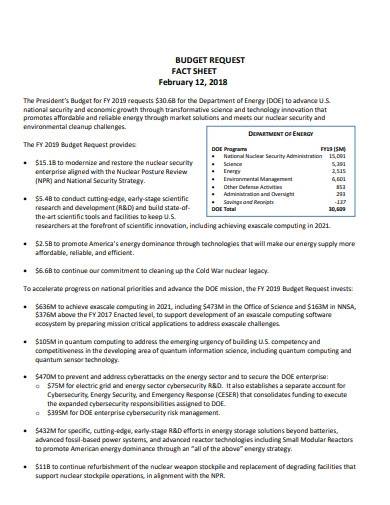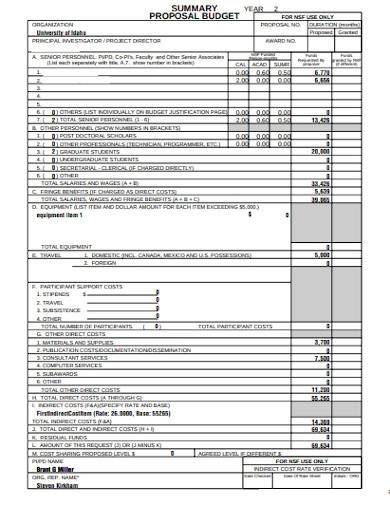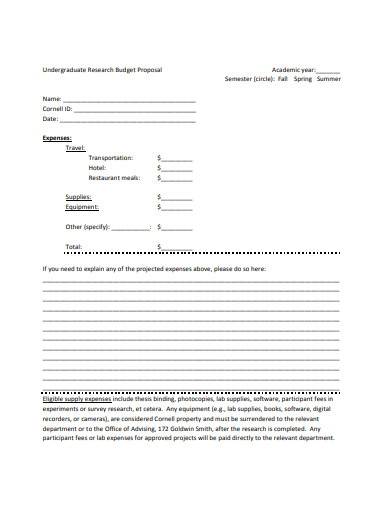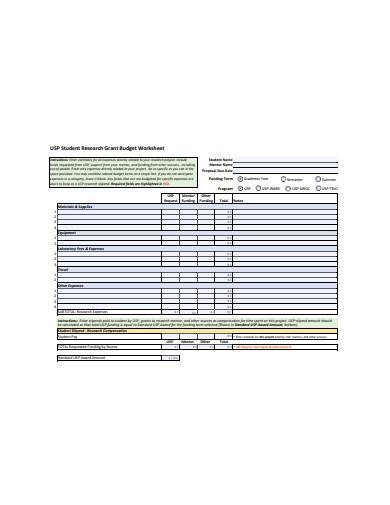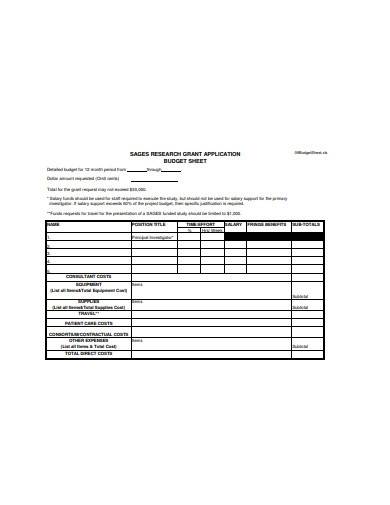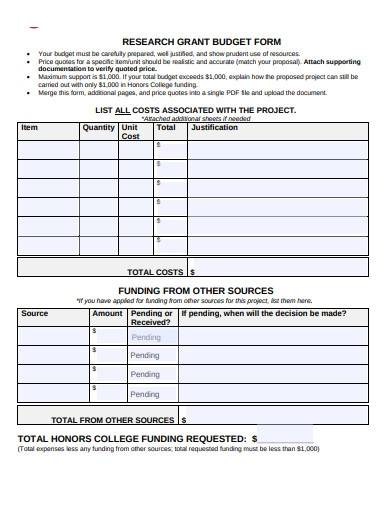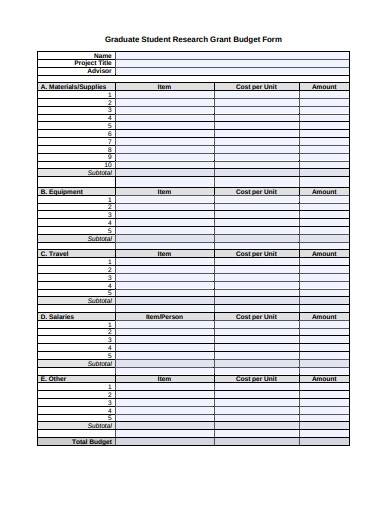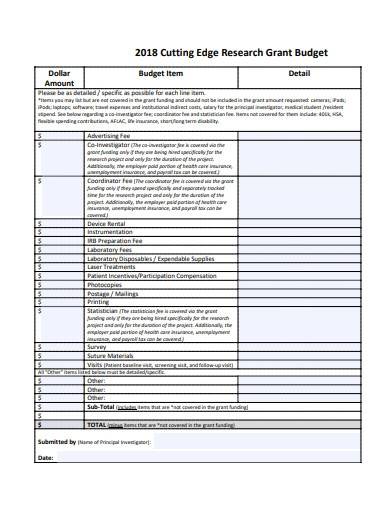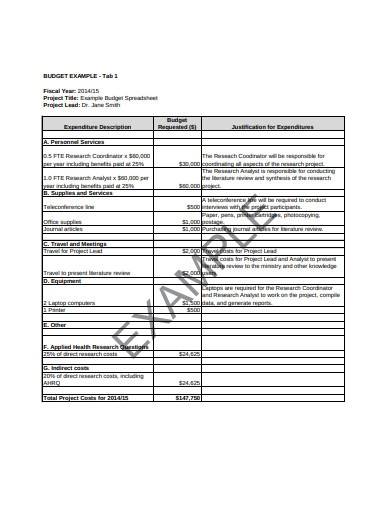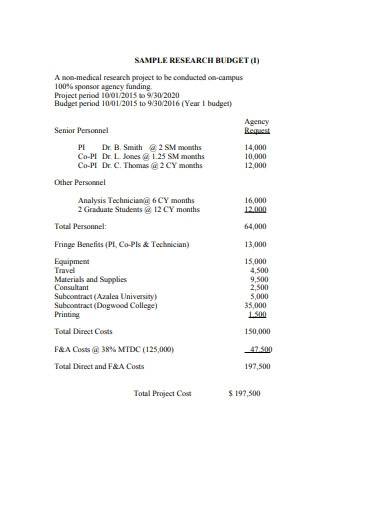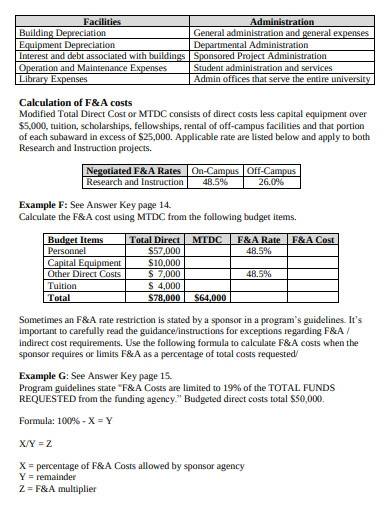While “researching” may seem like the work of the academics and the intellectuals, it’s a common process in business operations. Even in some of your daily activities involves finding information and employing methods that lead you to your desired answers. Professional researchers work hard to provide answers that will lead to the betterment of the people and their environment. However, no research process is possible without a research budget. This funding will help execute their plan and develop ways to reach their resources and evaluate their gathered data. Read more about the research budget as you scroll through this page.
FREE 15+ Research Budget Samples
1. Research Budget Template
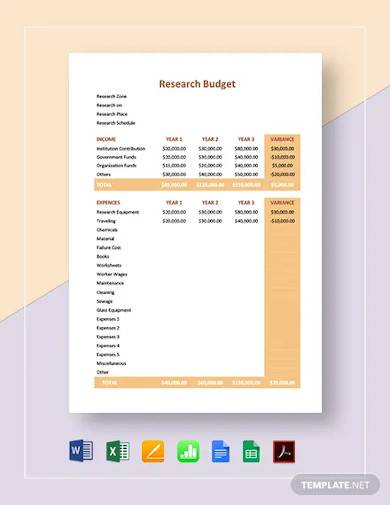
2. Research Project Budget Template
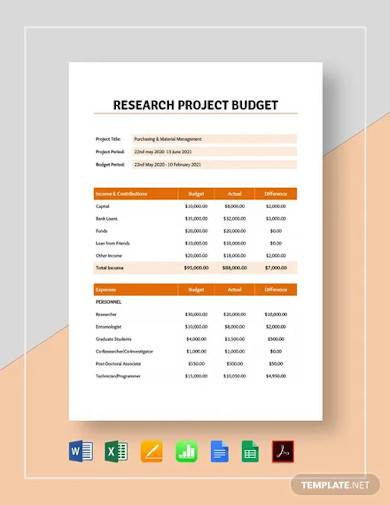
3. Medical Research Budget Template
4. Research Proposal Budget Worksheet
5. Sample Research & Development Budget
6. Research Budget Proposal Sheet
7. Research Proposal Budget Summary
8. Undergraduate Research Budget Sample
9. Student Research Grant Budget Worksheet
10. Sample Research Grant Budget Template
11. Research Grant Budget Form Sample
12. Sample Graduate Research Grant Budget
13. Sample Research Grant Budget
14. Basic Research Grant Budget Template
15. Sample Research Budget Format
16. Standard Research Proposal Budget
What Is a Research Budget?
A research budget is a tabular presentation of a research’s expenditures all throughout its process. It’s an important document to show when applying for research funding that will help give life to the goal of study. A researcher’s goal is to provide answers to queries and to help clarify data for analysis. This is useful not only in the educational, scientific, medical, and innovative fields but also in businesses.
Tips on How to Conduct a Successful Research
While it may seem unnoticeable, the scenery you see in today’s world is a product of multiple research and innovation. Every development came not in a blink of an eye but through a long process of data-gathering, testing, and multiple failed executions. Take for example Johanne Gutenberg’s printing press of the 14th century. Without his efforts, humans would have to write every book and document by hand painstakingly. The pursuit of knowledge never stops. In 2019, among the most prominent discoveries in the world included discovering two treatments for the Ebola virus that would render the disease curable instead of the opposite.
These are just some of the feats relentless research can uncover. If you want to contribute your own solution, here are some tips on how to conduct successful research:
1. When selecting a topic, research the topic’s background and make an effort to go through its terminologies and concepts. This way, it’s easier to formulate a thesis statement.
2. Gather your possible sources of information. Based on your topic, determine if you need to go through existing research papers, archives, news articles, or an expert’s words. This helps you identify your procedure early on.
3. Establish your method. Based on your topic and your resources, identify how you’re going to pull off the project. Will you hand out evaluation forms sheets or survey questionnaires? Are you forming a focus group? This serves as your research action plan’s steps towards your goals.
4. Use a variety of methods. It’s best to tap on different strategies so you can get more varied information.
5. Ensure that your sources are credible. This is imperative in every research project, but it’s important to reiterate that you must go out of your way to ensure that your using reliable resources.
6. Have a research outline. It’s easier to encode your report when you’re following an outline to ensure that you’ve included every necessary detail.
7. Revise when necessary. Along the way, you might find errors or blunders in your research. Don’t hesitate to revise when you need to.
How to Make a Research Budget
Besides knowing the right ways to conduct research, you also need funding to help you move forward and perform the procedure. When presenting a budget proposal, follow the tips below:
1. Make an Itemized List
Prior to making your budget, you should already have a set of activities that your research entails that needs the funding. This is why you should avoid drawing a budget plan without determining every activity involved in the research process. You may have to generate questionnaires and conduct a series of surveys. You may also have to do location visits and include a transportation budget on your list. The more complicated your project is, the more activities and funding’s it’s going to take. To help you sort everything out neatly, make an itemized list of all your expenses. Follow the categories and divide them into different sections so you’ll be able to present them neatly.
2. Follow the Rules
You should know that not everything on your list qualifies for support fro your funding agency. Before you finalized your list, check the rules. Identify which expenditures the rules allow and which are those that are not. It’s no use presenting a project budget breakdown that includes items that the guidelines disapprove of. You might need to fund your own travel budget, equipment, accommodation, or laboratory materials, among others. Check with your funding agency and find out what are items that you can bring into the list and if you have a budget limit so you can decide on your allocation.
3. Find the Costs
You already have a list of your prices. Now, all you need to figure out is each item’s costs. Avoid basing your budget on assumptions and do thorough research on the costs of your expenses. Calculate your timeline and determine how much you need until you research’s conclusion. If you’re traveling, identify how much you’ll be spending on your journey. If you’re outsourcing services, determine where you draw the line for your budget. If you’re offering tokens to participants, set how much you’re willing to give. Avoid giving a budget request estimate that is too high or too low, or you might compromise your research plan.
4. Justify Your Budget
Your research can have different components and procedures that you need to fulfill, and that means more items on your budget spreadsheet. Justifying why those items deserve a spot on your budget is an important part of this document. Compared to other budget plans, your funding agency needs the significance of each component and why they should approve of it. They should also know how you came up with the cost figures. When providing a reason for your items, always refer to its importance on your research proposal. For example, if you’re hiring a statistician, explain why you need a professional to present and interpret your collected data.
FAQs
What are the different research budget categories?
There are two categories of research budget: direct costs and indirect costs.
What are the different types of budgets?
The different types of budgets are balanced budget, deficit budget, and surplus budget.
What do you mean by consumable supplies in a budget?
Consumable supplies are those that are used exclusively for the project at hand. They are those that ran out after the project finishes, so it’s considered a part of the direct costs.
Research is an effort towards finding more of what the world has to offers. It exposes the truth, clarifies misconceptions, and discovers interesting and helpful data that can leave a useful impact on whoever will benefit it. If you’re a researcher looking for ways on how to make the right research budget for your study, don’t bother. Pick from our high-quality options of budget templates. Download now!
Related Posts
FREE 10+ Advertising Budget Samples in PDF
FREE 10+ Manufacturing Overhead Budget Samples in MS Word | Google Docs | Google Sheets | MS Excel | PDF
FREE 5+ Small Freelance Team Budget Samples in MS Word | Google Docs | Google Sheets | MS Excel PDF
FREE 10+ Annual IT Budget Samples in MS Word | MS Excel | Google Docs | Google Sheets | PDF
FREE 5+ Yearly Budget Planner Samples in PDF | XLS
FREE 10+ Expense Budget Samples in MS Word | Google Docs | Google Sheets | MS Excel | PDF
FREE 4+ Vacation Budget Planner Samples in PDF
FREE 10+ Budget Outline Samples in PDF | MS Word
FREE 10+ Conference Budget Samples in MS Word | MS Excel | Google Docs | Google Sheets | Apple Pages | PDF
FREE 10+ Monthly Budget Worksheet Samples in PDF | MS Word | Google Docs | Google Sheets | Excel
FREE 10+ Monthly Project Budget Samples in MS Word | MS Excel | Google Docs | Google Sheets | PDF
FREE 10+ Corporate Budget Samples in MS Word | MS Excel | Google Docs | Google Sheets | PDF
FREE 9+ Primary School Budget Samples in MS Word | Google Docs | Google Sheets | MS Excel | PDF
FREE 10+ Operational Budget Samples in PDF | DOC
FREE 5+ Budget Layout Samples in PDF

